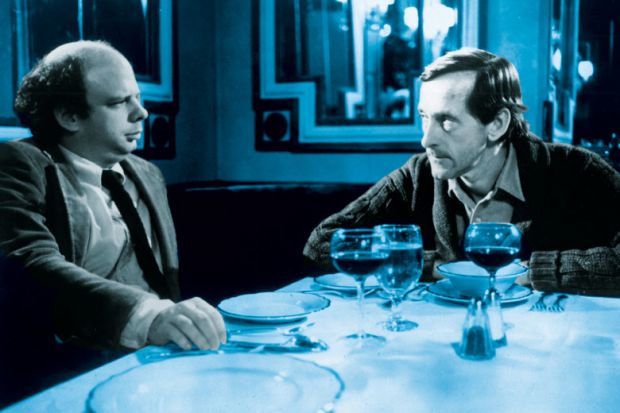From cliques to klatches
As an undergraduate, I naively assumed my professors were all friends and that every night of their lives must unfold like a scene from My Dinner with Andre. In my muddled imagination, academics spent their days writing books and their nights engaged in life-changing conversations, always at an opulent restaurant or each other’s sprawling homes. Unsurprisingly, this fantasy didn’t take long to wither on the vine.
In the English department where I started my career (on a temporary contract with a mandate to teach the courses no one else was willing to teach), I wasn’t on anyone’s dinner party circuit. I soon learned that I didn’t even warrant a casual lunch or passing hallway conversation. When I introduced myself to one colleague, an eccentric poet who had been teaching in the department for three decades, she wasted no time telling me, “I don’t talk to colleagues.” A portly Victorian literature scholar with a bloated ego to match was more direct, letting me know, without sugarcoating her dismissal, “Given your lack of pedigree, you’re lucky we even hired you.”
If my encounters with senior colleagues were humiliating, my encounters with the other new hires were only marginally better. The first question typically asked was, “What type of line were you brought in on?” or “Who was your dissertation supervisor?” Cliques were formed based on hiring status and perceived academic currency.
By the time I accepted a second academic position, I had no expectations of meeting friends on the job. I also appreciated that I wasn’t alone at least in that pessimism. Without enough good jobs or funding to go around, competition is high and trust is low, making workplace friendships difficult for many scholars of my generation even to fathom.
Then the pandemic arrived. I struggled to relate to friends in other walks of life who were lamenting the loss of their “work friends”, yet by the time I returned to campus over a year later, I realised that something had to change. By now, I was a senior colleague and department chair, and cultivating a friendlier department suddenly felt urgent. The decision was partly based on the observation that my newest hires had never even met any colleagues in person, but this wasn’t the only reason for the change of heart.
During the pandemic, several older colleagues had been urged to retire as the university looked for ways to prune its expenses. Most were sent off with nothing more than a depressing “Zoom party”. The lack of care troubled me. Among the colleagues who remained, many looked exhausted after being trapped at home juggling childrearing and online teaching for more than a year. As I started to check in, usually in fleeting conversations on the sidewalk because we still weren’t permitted to hold in-person meetings, I realised that nearly everyone in my department was also mourning the loss of a parent, friend, or marriage. In some small way, I wondered if creating a friendlier department, if not a department of friends, might also help us heal.
Due to the peer-review process that requires academics to make both small and sometimes life-changing decisions about peers, there is nothing easy about academic friendships. But beyond making work a bit more pleasant, a friendlier environment can increase trust and transparency, and by extension, help us identify and collectively confront problems, including systemic inequities, that would otherwise be impossible to challenge.
Kate Eichhorn is an associate professor and chair of culture and media studies at The New School in New York City.
The lunch clubbables
When I mentioned to my wife I was writing a piece about friendship in academic life, her response was terse: “That’ll be a short piece, then.”
Her remark brought to mind the old MP explaining to a younger one that the “people on the other side of the House are the opposition while those on your side are the enemy”. Or Steve Archibald’s remark that team spirit in professional football is something that exists only for 10 minutes after you’ve just won a major trophy, the normal relationship between team members being dominated by rivalry and petty jealousy about selection and contracts. Academic life is surely full of aspiration and ambition like politics and football, isn’t it? That is certainly how it is portrayed in fiction, particularly crime fiction. But they would say that, wouldn’t they?
And that isn’t how it was for me. During the core of my career, between half a dozen and a dozen of my colleagues were close friends. Our friendship was instituted through something called “the lunch club”, which had us sitting in the departmental common room with our “brown bags” and discussing everything under the sun. To give a sense of this institution, one of its members (still a very good friend) has reported in print that he used to eat his lunch early so that he could get his arguments in while I had my mouth full. (Yes, specifically me: I may be shy and retiring in my heart, but apparently that’s not the impression given.) Others have admitted that when supposedly working at home they would sometimes “nip into the department to pick up their post” in order not to miss the lunch club. We also extended to the “Friday night drink”, which is self-explanatory though it is probably worth remarking that this was possible because we all lived fairly close to each other. I’m guessing that would rarely be true of the members of a contemporary academic department.
We have remained friends in so far as dispersal, old age, illness and the other thing allow. We occasionally erupt into email discussions and very occasionally we quarrel. One old friend announced on social media that he was not going to speak to me again after I had said that, as an Englishman, I favoured Scottish independence. He is a Scot and a Unionist and I admit it was a bit of a wind-up, my real view being a much more nuanced, “It depends what you mean” sort of thing. Anyway, cutting me out of his life lasted 20 minutes before he was on the phone and we were friends again.
I have no idea how common this sort of solidarity between colleagues is or was, but the historical context is important. Between 1976 and 1989, a total of one “new blood” appointment was made in our department, and the individual concerned was recruited on the grounds of what the founding professor called “assimilability” – which turned out to be the opposite of what is now called diversity. And the granting of promotion and the British version of tenure was as rare as recruitment. I, for one, did not think of myself as having a career, but as having a particularly nice job that allowed me to do lots of other things. Colleagues were like family in certain respects, perhaps most obviously in that you were stuck with them, and warm relationships were much more fun than cold ones. We knew that some of us were better at teaching and some far more likely to produce published work of significance than others, but that was no kind of issue at all. It was just the way things are in human communities.
After the calm, the storm. From the end of the 1980s, we faced a tidal wave of change to our way of life: massive expansion, internationalisation, research assessment, teaching assessment and, above all, what came to be known as “precarity”. At the last departmental meeting I attended, 11 new members were introduced, all but one on temporary contracts. On reflection, I realise that in the first 20 years of my career, friends were acquired mainly from university life, but in the last 15 it was almost entirely from the town we live in.
I have, however, acquired a really good friend in the peripatetic, retired, “emeritus” and “visiting” life purely through academic work. We have eaten, drunk and even holidayed and written a book together. It does help, though, that we share something more than royalties and citations – we both support Burnley Football Club.
Lincoln Allison is an emeritus reader in politics at the University of Warwick.
Job market forces
Academic friendship is currently on my mind. I’ve just started my first permanent job after many years on short-term contracts, moving between the US and the UK, making new friends only for one of us to move away almost every year.
The important friends have stayed the same, but being on the job market can make you feel that everything else has to come above those friendships. This isn’t and shouldn’t be true, but the need to continually be working on the next thing can make it hard to feel like you can ever prioritise your social life. There have also been periods in my career when I have focused on teaching and interacting with colleagues, only later realising how much I was missing my own friendships, whether they were within or outside of academia.
After you’ve been in academia for a number of years, there is also a strange moment when you wonder if your academic friends are, in fact, your “real” friends. After all, they are the ones who understand the need to cancel plans to meet deadlines, who are OK with fitting in seeing each other around the dates of conferences, and who know that you might be in and out of touch depending on how heavy your teaching load is. But while friendships with colleagues – and mentors – are certainly possible, those friends who don’t think about footnotes for a living are obviously just as important.
I don’t know how I would classify some of my academic relationships that I conduct primarily via the democratising web of connectedness that is social media. Are these people whose Instagram photos I comment on colleagues or friends? Are we scholars who work in similar fields or are we friends who know each other through work?
Of course, having friends in academia can also get complicated when these friends become competitors in what is a very small job market. And there is social anxiety, too. I remember – now with a twinge of embarrassment – turning down the opportunity to live with some people from my English PhD programme because I found some of them, more advanced in their degree than I was, slightly intimidating. Living with them, I felt, would mean I would have to be always on, striving to get the literary jokes and references, when I already felt under-read and sometimes out of my depth.
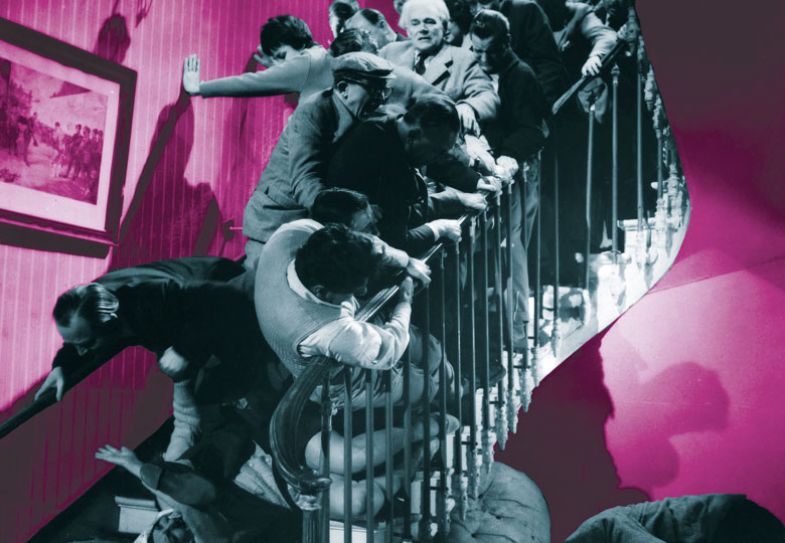
Ironically, it has been those friends – or one in particular, who has since left academia – who have helped sustain me through my university career. Knowing that I was struggling to begin the difficult task of turning my dissertation into a book, this friend showed up to the office I had as a postdoc, opened my computer and started a document entitled “Book”, complete with a funny title and dedication (“In Memoriam: Alice’s PhD, 2009-2014 – Lest We Forget”). This small act, a joke between friends, helped me much more than he probably ever realised. Yet competition remains an ever-present barrier to academic friendships, and it cuts both ways: I sometimes find myself not wanting to tell my early-career, precariously employed friends that I have finally got a permanent job because I know the combined feeling of warmth and jealousy that this can evoke.
One unanticipated benefit of the academic writing group I organise is that it means PhD students and postdocs work alongside one another, rather than in individual bedrooms, offices or library cubicles, and this means that nobody can remain intimidated by peers they might otherwise see as “cleverer” or “more accomplished” than themselves. It changes your relationship with someone when you see them also struggling with a first draft or desperately trying to condense an idea into a 300-word paper abstract. And individual scholarly accomplishments became genuinely shared; for a while, I even sent a weekly email of the writing group’s recent accomplishments (usually with the cheesy beginning “Dear Team AWG”).
So as I navigate this new stage of my career, with its unfamiliar promise of permanency and the possibility of stable, long-term relationships, I will be trying to make new friends at my new institution, while maintaining and nurturing existing friendships, both academic and otherwise. This includes the friends I meet at conferences, the past colleagues and mentors who have become friends, the network of early-career researchers who support and sustain each other through the academic job market, and the escape and joy of friends outside academia. All have their place – and, combined, they make the whole academic venture possible.
Alice Kelly is assistant professor in literature and history at the University of Warwick.
Friends of convenience
I’ve always enjoyed having friends in academia. From informal chats in the corridor to full-on intellectual debates, I’d relish my exchanges with the fun and lively characters found on campus. As an excellent networker while in post, I had a lot of academic “friends”.
But in universities there is always a good deal of friendliness on the surface: it’s part of the culture to smile and banter. At the same time, though, a substantial amount of gossiping and backstabbing goes on. And, like many scholars, I’ve often found scholarly “friendships” to be rather weak and transient. They rely tremendously on the work you read, the work you do and the work you plan to do – often together. They are liable to evaporate when you are no longer useful to each other.
Hence, I didn’t expect to maintain any academic friendships once I left university life to work as an independent scholar five years ago. Yet a few significant connections are proving brilliantly robust – even if my relocation to Tuscany means we are generally able to meet only via Zoom.
I now realise that some people I met at university were genuinely able to connect and care, and I’m honestly humbled to know them because they combine this with being really clever. But it wasn't obvious to me at the time which were the true friends and which were the friends of convenience. One of my best academic friends now used to be my boss, for instance: I definitely would not have predicted that at the time!
It is true that these enduring friendships still rely somewhat on shared projects and dreams involving meaningful scholarship – but all friends have common interests, after all.
With some distance on my former university life, I also reflect on the element of trauma bonding among academic friends. To cope with the difficulties of being in academia, scholars often hang out exclusively with other academics even after the working day is done.
I used to be like that. It was a relief to discuss the academy with people who knew its inside story. I was addicted to the scholarly species as companion. And now that I have stepped away from the fire, I know that the opportunity to forge strong new academic bonds of that kind has probably gone.
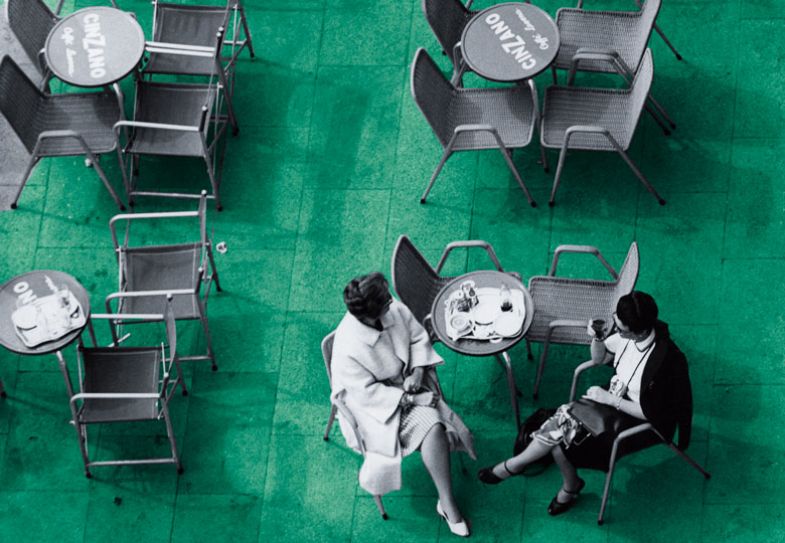
But I am relieved. It wasn’t easy, but leaving the academy returned me to myself and to what matters most when we have all put down our books: love. I can honestly say I love the academic friends who have held on to me since I left my university career. I’m lucky. But inside the academy, I couldn’t see the love for the mutual desperation.
Helen E. Lees is author of Playing the University Game: The Art of University-based Self-Education, published by Bloomsbury in 2022.
An inkling of iconoclasm
Making friends and acquaintances with fellow scholastic travellers is probably the most important element of the modern academic career – but it is often overlooked.
In his classic 1960 book The Four Loves, the literary scholar and popular Christian apologist C.S. Lewis goes back to the mathematicians of antiquity to distinguish between two types of “intellectual friendships”. The first type is the pragmatic Egyptian and Babylonian model, whereby mathematics was “practical and social, pursued in the service of Agriculture and Magic”.
This instrumental model of academic friendship still bears fruit. A 2019 study by UCL scientists of 22,000 published academics found that junior scientists who develop collegial ties with a leading researcher early in their career are more likely to emerge as leading researchers themselves. I have also found in my own professional life how friendships that lead to co-authorships can make for greater productivity and a fuller CV. And so did the Hungarian mathematician Paul Erdős. He may have been dubbed the oddball’s odd ball by Time magazine, but his hypoxia-inducing 1,525 papers included collaborations with 511 colleagues and friends. He would typically turn up unannounced at a collaborator’s house, declaring: “My brain is open.”
The second type of intellectual friendship identified by Lewis was practised by the ancient Greeks. For them, mathematics was a leisurely pursuit carried out among friends and pupils. The results were less practical but, argues Lewis, their legacy matters to us more.
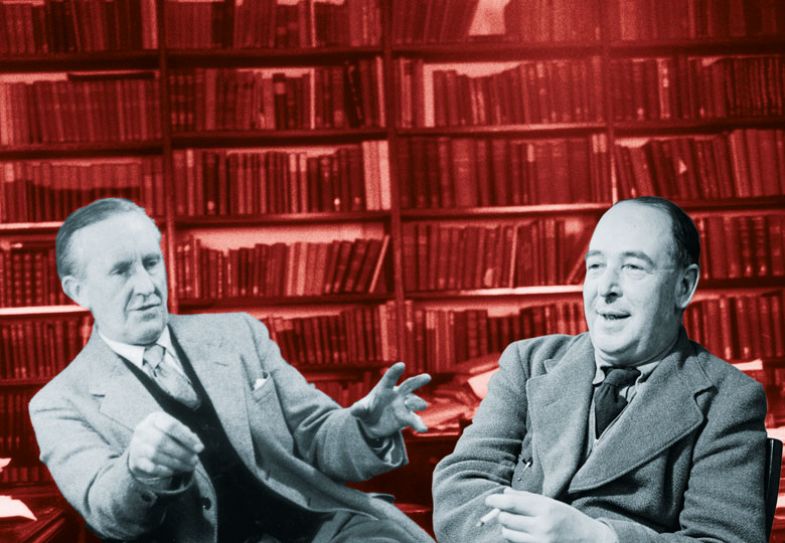
The model of friendship that Lewis cultivated during his time at Oxford was something of a hybrid between the instrumental and non-instrumental kinds. His “little knot of friends”, known as The Inklings, certainly had a purpose and an impact – but its point was not to foster collaboration on literary scholarship but, rather, to encourage the members in their true calling as storytellers in their own right.
The Inklings met weekly to drink and read from fictional works in progress, including J. R. R. Tolkien’s The Lord of the Rings and Lewis’ The Lion, the Witch and the Wardrobe – not only great literary achievements but also landmarks in popular culture, which paved the way for modern fantasy fiction, from Game of Thrones to Harry Potter.
So Lewis and Tolkien’s friendship was in but not of the academy. But friendships that transcend academia and the pursuit of narrow academic goals are, in my experience, too, the most important.
I met Kevin Stagg more than 20 years ago, when we started in the department at around the same time. Kevin was older than me and worked as an economic historian (I am neither a historian nor an economist), but we immediately bonded over a shared interest in post-punk and German kosmische musik. We initially toyed with the idea of doing a research project on independent record shops – but it would mainly have been a ruse to travel the UK hunting out obscure vinyl and it never got past the talking stage.
What I valued most about Kevin was his iconoclasm. He came to academia later in life than I did, and, as such, he could see through the pomposity and delusions of modern scholarship. He considered Michel Foucault, a much-hyped figure in management schools, to be a crap historian and an overrated thinker, for example. And his formidable intelligence and frank views came with a sense of fun and mischief. He rarely called me by my Christian name, for instance, preferring to call me “Scumbag”. But he loved his job and his department, and he was a brilliant teacher and a committed senior manager.
Before Christmas Kevin passed away quite suddenly. Life now has less colour, less laughter, and, yes, less of the occasional madness. Now Kevin has gone, I am like a dog with three legs – still a dog, but forever changed.
Michael Marinetto is a senior lecturer in management at Cardiff Business School. He dedicates this piece to the memory of Kevin Stagg (1958-2022).
Pandemic cheers
More than a decade after I entered academia, my family still does not understand how peer review works.
This statement is not an indictment of them; after all, it takes years of complete immersion in this environment to fully understand the idiosyncrasies that differentiate academic research from other professions. Rather, it emphasises that friendships with colleagues are a vital lifeline for academics, particularly trainees and early-career PIs.
This was especially so for me personally during the pandemic. As a computational scientist, I was fortunate to be able to work from home during the most challenging periods of the past three years. But this was also an isolating experience, as I was cut off from all face-to-face (or, more accurately, mask-to-mask) interactions with my colleagues. Maintaining the lines of communication necessary for my collaborations faced additional hurdles, as did obtaining feedback and mentorship from my supervisors.
Having a support system of friends within academia was invaluable. My friends outside research could empathise with my postdoctoral anxieties, such as the inherently transient nature of year-to-year contracts, up to a point. But it was through my academic friends that I not only confirmed that these feelings were valid and universal but found the necessary support to overcome them.
Ironically, my most valuable academic friend during this period was a traditional experimentalist who was spending time in the lab. Despite our different pandemic experiences, our constant text messaging and video calls provided us both with an invaluable confidant. It helped that we became each other’s biggest cheerleaders: I find their research to be some of the most fascinating, challenging and impactful work I have ever seen, and they reciprocate those feelings about mine. When I experienced impostor syndrome following a fellowship or paper rejection, they were there to build me back up, a favour I was all too happy to return when the tables were turned.
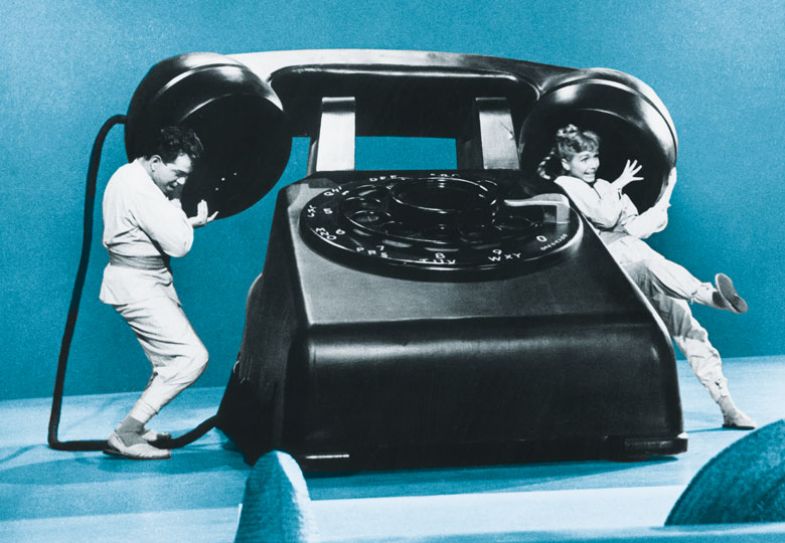
As I progressed in my postdoc and became more active on the academic job market, having connections with more senior academics became vital. My network provided me with not just traditional mentors who had already founded their labs, but true friends. Having natural conversations with these individuals, flowing between traditional advice on my applications and open and honest insights into their own experiences on the job market, made me feel authentically seen and valued, validating my feelings.
At a career stage when trainees are arguably at their most vulnerable even in the absence of a pandemic, these interactions gave me the practical and emotional support I needed. I can honestly say that I may not have persevered through those challenging times without them. It is my sincere hope that the academic community places a renewed focus on fostering such relationships as we return to something like normal life.
Scott Rich is a postdoctoral research fellow at the SickKids Research Institute, which is affiliated with the University of Toronto.
Register to continue
Why register?
- Registration is free and only takes a moment
- Once registered, you can read 3 articles a month
- Sign up for our newsletter
Subscribe
Or subscribe for unlimited access to:
- Unlimited access to news, views, insights & reviews
- Digital editions
- Digital access to THE’s university and college rankings analysis
Already registered or a current subscriber? Login
